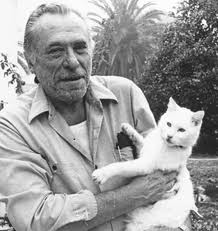What is Banned Books Week anyway? “Banned Books Week is an annual event celebrating the freedom to read. Banned Books Week was launched in 1982 in response to a sudden surge in the number of challenges to books in schools, bookstores and libraries. Typically held during the last week of September, it highlights the value of free and open access to information.”*
 In 1985, Charles Bukowski’s book, “Tales of Ordinary Madness” was challenged and asked to be removed from a public library due to it being, “‘very sadistic, occasionally fascist and discriminatory against certain groups (including homosexuals).'” Who is in the right? How does one, or one group, deem art to be worthy or unworthy? How does one group decide the level public exposure? Does one person’s subjective resistance to a topic deem it suitable for termination? Have you ever wanted to challenge a piece of film or literature? Below is Bukowski’s response, which holds true today, over 30 years later.
In 1985, Charles Bukowski’s book, “Tales of Ordinary Madness” was challenged and asked to be removed from a public library due to it being, “‘very sadistic, occasionally fascist and discriminatory against certain groups (including homosexuals).'” Who is in the right? How does one, or one group, deem art to be worthy or unworthy? How does one group decide the level public exposure? Does one person’s subjective resistance to a topic deem it suitable for termination? Have you ever wanted to challenge a piece of film or literature? Below is Bukowski’s response, which holds true today, over 30 years later.
Dear Hans van den Broek [journalist]:
Thank you for your letter telling me of the removal of one of my books from the Nijmegen library. And that it is accused of discrimination against black people, homosexuals and women. And that it is sadism because of the sadism.
The thing that I fear discriminating against is humor and truth.
If I write badly about blacks, homosexuals and women it is because of these who I met were that. There are many “bads”–bad dogs, bad censorship; there are even “bad” white males. Only when you write about “bad” white males they don’t complain about it. And need I say that there are “good” blacks, “good” homosexuals and “good” women?
In my work, as a writer, I only photograph, in words, what I see. If I write of “sadism” it is because it exists, I didn’t invent it, and if some terrible act occurs in my work it is because such things happen in our lives. I am not on the side of evil, if such a thing as evil abounds. In my writing I do not always agree with what occurs, nor do I linger in the mud for the sheer sake of it. Also, it is curious that the people who rail against my work seem to overlook the sections of it which entail joy and love and hope, and there are such sections. My days, my years, my life has seen up and downs, lights and darknesses. If I wrote only and continually of the “light” and never mentioned the other, then as an artist I would be a liar.
Censorship is the tool of those who have the need to hide actualities from themselves and from others. Their fear is only their inability to face what is real, and I can’t vent any anger against them. I only feel this appalling sadness. Somewhere, in their upbringing, they were shielded against the total facts of our existence. They were only taught to look one way when many ways exist.
I am not dismayed that one of my books has been hunted down and dislodged from the shelves of a local library. In a sense, I am honored that I have written something that has awakened these from their non-ponderous depths. But I am hurt, yes, when somebody else’s book is censored, for that book, usually is a great book and there are few of those, and throughout the ages that type of book has often generated into a classic, and what was once thought shocking and immoral is now required reading at many of our universities.
I am not saying that my book is one of those, but I am saying that in our time, at this moment when any moment may be the last for many of us, it’s damned galling and impossibly sad that we still have among us the small, bitter people, the witch-hunters and the declaimers against reality. Yet, these too belong with us, they are part of the whole, and if I haven’t written about them, I should, maybe have here, and that’s enough.
may we all get better together,
yrs,
(Signed)
Charles Bukowski
7-22-85**
*https://bannedbooksweek.org/about/
**http://www.lettersofnote.com/search?q=+charles+bukowski

